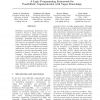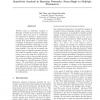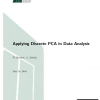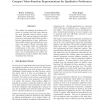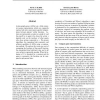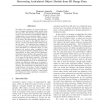UAI
2004
14 years 1 months ago
2004
Mixtures of truncated exponentials (MTE) potentials are an alternative to discretization for representing continuous chance variables in influence diagrams. Also, MTE potentials c...
UAI
2004
14 years 1 months ago
2004
Defeasible argumentation frameworks have evolved to become a sound setting to formalize commonsense, qualitative reasoning from incomplete and potentially inconsistent knowledge. ...
UAI
2004
14 years 1 months ago
2004
Previous work on sensitivity analysis in Bayesian networks has focused on single parameters, where the goal is to understand the sensitivity of queries to single parameter changes...
UAI
2004
14 years 1 months ago
2004
UAI
2004
14 years 1 months ago
2004
We consider the challenge of preference elicitation in systems that help users discover the most desirable item(s) within a given database. Past work on preference elicitation foc...
UAI
2004
14 years 1 months ago
2004
The complexity of a reasoning task over a graphical model is tied to the induced width of the underlying graph. It is well-known that the conditioning (assigning values) on a subs...
UAI
2004
14 years 1 months ago
2004
Action-graph games (AGGs) are a fully expressive game representation which can compactly express both strict and context-specific independence between players' utility functi...
UAI
2004
14 years 1 months ago
2004
We address the problem of unsupervised learning of complex articulated object models from 3D range data. We describe an algorithm whose input is a set of meshes corresponding to d...
UAI
2004
14 years 1 months ago
2004
Humans currently use arguments for explaining choices which are already made, or for evaluating potential choices. Each potential choice has usually pros and cons of various stren...
UAI
2004
14 years 1 months ago
2004
Within the task of collaborative filtering two challenges for computing conditional probabilities exist. First, the amount of training data available is typically sparse with resp...

